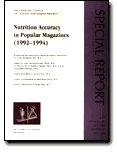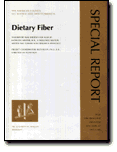Scientists from the American Council on Science and Health called on both the Clinton White House and Republican candidate Bob Dole to back up their recent statements about their commitment to keeping America's children tobacco-free.
Search results
A leading public-health scientist today advised state attorneys general against signing a pending deal with the tobacco industry a deal that would give the industry immunity from individual or class-action lawsuits. Dr. Elizabeth Whelan, president of the American Council on Science and Health, stated in a letter to the attorneys general, "Such a settlement would be contrary to the interests of public health and will mean that you will forever be known as having sold out to the tobacco industry."
(From Priorities Vol. 8, No. 2, 1996)
FYI: Three Classes of Medical Devices -- ![]() devices (download)
devices (download)
Popular magazines Reader s Digest, Good Housekeeping, McCall sand the like used to be America s number-one source of nutrition information. Today, magazines take a back seat to TV; but according to the American Dietetics Association, a solid 39 percent of the American public still gets most of its nutrition news from magazines. Those readers need to know that the information they get from their favorite magazines is both accurate and reliable. ![]()
A leading public health consumer group said that any deal with the cigarette industry that includes shielding it from current and future private-sector litigation would be an unparalleled setback for the cause of public health in America.
Scientists from the American Council on Science and Health today criticized a full-page newspaper ad in which a major pharmaceutical firm decreed that some laxatives may cause cancer
Are commercial agricultural practices impoverishing our soils? In particular, is the practice of replacing soil minerals with commercial fertilizers impairing the nutritional content of plants?
Rich Soil, Poor Soil
The public is often faced with conflicting "expert" opinions on how dietary components allegedly contribute to the cause, prevention, and cure of a host of health and even social problems. These supposedly nutrition-related problems range from Alzheimer's disease and immunologic disorders to juvenile delinquency and homicidal behavior.
New York, NY January 30, 1998. In a new report on pesticide residues on America's fruits and vegetables, the Environmental Working Group (EWG) has twisted data and misinterpreted basic scientific information in a way calculated to provoke fear among America's parents. This was the conclusion of the American Council on Science and Health (ACSH), a consortium of over 250 leading scientists and physicians.
New York, NY January 13, 1998. The American Council on Science and Health today pointed to the results of a new study confirming what those who have studied the safety of the new fat substitute olestra have long known: that eating chips fried in olestra does not cause adverse gastrointestinal effects as olestra's now-discredited, highly vocal critics have been claiming.
New York, NY February, 1998 The American Council on Science and Health (ACSH) has reported that, as a group, consumer-oriented magazines outrank other types of magazines in the quality of their nutrition reporting, with homemaking publications rated a close second. These findings were part of ACSH's seventh survey of nutrition reporting in popular magazines, in which 15 of 21 magazines surveyed were rated as either "Excellent" or "Good" sources of nutrition information.
Self-appointed protectors of the environment have a long history of advancing their agendas by postulating sinister threats to our children, distorting the views of mainstream science, and dismissing their critics as profit-hungry plunderers of public health. Advocates of more stringent "air quality" standards are keeping up the tradition. If they succeed, we will soon be harnessed with extraordinarily costly new regulations that could harm public health more than improve it.
In a culture where words like "artificial," "synthetic," and "man-made" are often used as slurs and the masses increasingly applaud so-called natural healing, a revolution in what might reasonably be termed "unnatural healing" is proceeding almost full blast yet so quietly that the public has scarcely noticed it.
New York, NY March 1998. A study published in Cancer, the journal of the American Cancer Society, reports findings that confirm what the American Council on Science and Health (ACSH) has long held: that cancer rates are falling in the United States and that death rates from the disease are declining. ACSH's position on U.S. cancer rates was set forth in detail in a 1995 booklet, Update: Is There a Cancer Epidemic in the United States?
The onset of menopause presents a complex set of questions to many women. One of those questions may be whether or not to begin hormone replacement therapy (HRT).
To the Editor:
When Dr. Samuel Epstein (letter, March 15) refers to "the cancer epidemic," he apparently believes that if he and his activist cohorts repeat a falsehood often enough, the American public will come to believe it. The facts, however, prove that the opposite is true: according to statistics published by the National Cancer Institute, and endorsed by the American Cancer Society, cancer incidence and mortality rates have been declining over the past five years.
New York, NY July 1998. In a statement released in June 1998 the New York Public Interest Research Group (NYPIRG) reported that 9,000 children in New York City have tested positive for lead poisoning.
Background
While food safety in the United States has been and continues to be very good, outbreaks of foodborne illness and deaths attributable to such illnesses have caught the attention of the public, the media,1,2 and governmental agencies. The perception that such outbreaks are increasingly frequent and serious are prompting queries into the best means of reducing their frequency and extent.
This week, the Journal of the National Cancer Institute (NCI) confirmed that the apparent increase of brain tumors in children over the last 20 years is the direct result of our improved ability to detect them.
In actuality, there has been little change in the rates of brain tumors. With the help of technology, specifically high tech screening devices, we re simply doing a better job of diagnosing them.
Yet the environmentalist community continues to warn us that the United States is experiencing a cancer epidemic and that chemicals are to blame.
New York, NY, August 28, l998 Scientists at the American Council on Science and Health today criticized the Kellogg Company s full page advertisement touting the eating of Kellogg s All Bran as a means of reducing colon cancer risk. In making its claim for the cancer protection effect of its cereal, Kellogg points to the results of a recent laboratory animal study showing cancer protection linked to the consumption of a particular type of processed wheat bran.
What topic can embroil one of Britain's leading scientific journals, various newspaper, TV and radio commentators, as well as the Royal Society British counterpart to our National Academy of Sciences in heated controversy? The culprit, at least at first glance, is genetically engineered potatoes. But the real question underlying this latest skirmish in the bioengineering wars is 'what constitutes good science?'
The American Council on Science and Health (ACSH) is disappointed, but not surprised, by activists continued attempts to discredit a panel of well-respected, nationally and internationally recognized scientific and medical professionals, headed by the former U.S. Surgeon General Dr. C. Everett Koop. Once again, there has been an attempt to shift attention from sound science to misrepresentations and half-truths.
Pagination
ACSH relies on donors like you. If you enjoy our work, please contribute.
Make your tax-deductible gift today!





